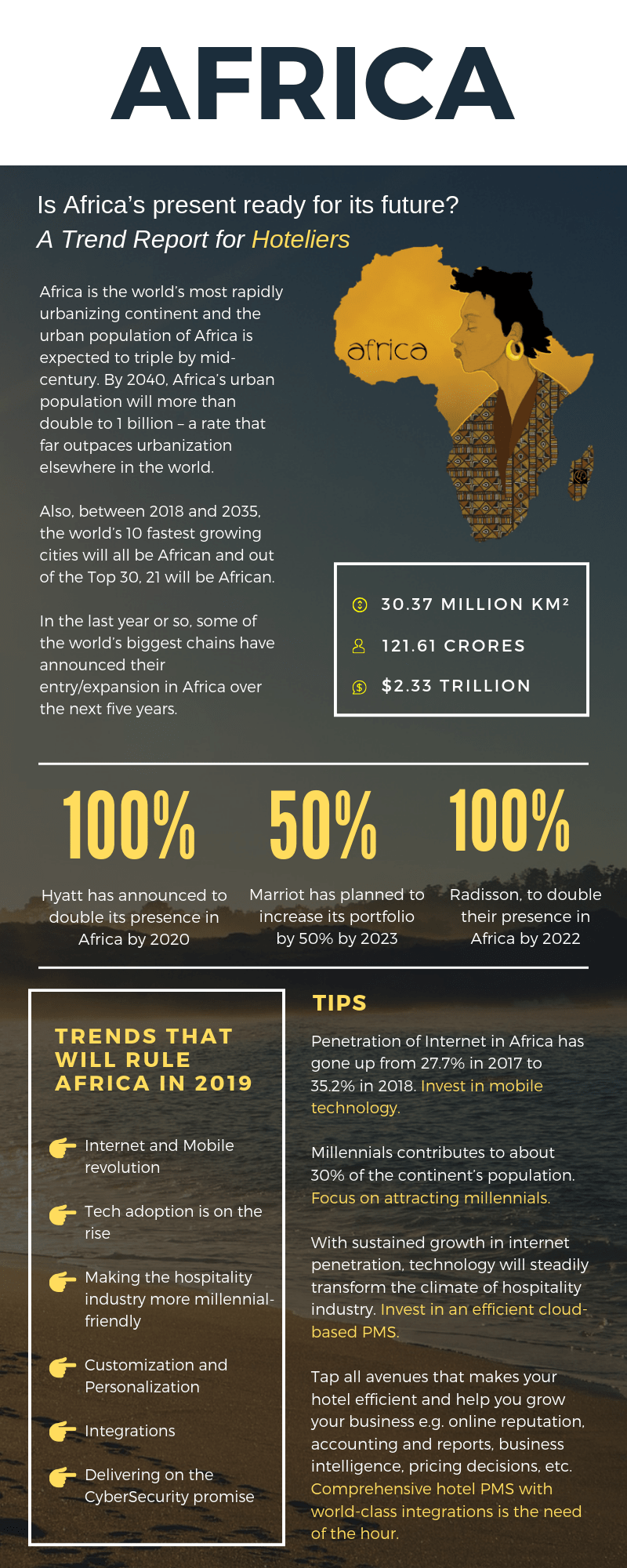THE BACKGROUND:
Africa is the world’s most rapidly urbanizing continent and the urban population of Africa is expected to triple by mid-century. By 2040, Africa’s urban population will more than double to 1 billion – a rate that far outpaces urbanization elsewhere in the world.
If you are startled by that, here’s another stat that will knock your socks off. Between 2018 and 2035, the world’s 10 fastest growing cities will all be African and out of the Top 30, 21 will be African.
No other region in the history of the world has ever seen this kind of rapid and mass urbanization, as Africa is expected to witness in the next decade or two. While these stats confirm the possibility of Africa being on the path to some massive economic and social reforms in the next decade or two, the business ecosystem in the continent is also about to witness an enormous and unprecedented shift. In this article we will look at the implications of such a dramatic forecast and its implications on tourism and most importantly, hospitality.
THE SUDDEN RISE OF HOSPITALITY INVESTMENT IN AFRICA
In the last year or so, some of the world’s biggest chains have announced their entry/expansion in Africa over the next five years. This has opened up several windows of opportunity for African Hospitality sector to flourish and grow further. Factors like the stabilization of the socio-political situation in the continent, the rise of the middle-class, the growth in the economic index, etc. have made Africa a treasure trove of potential opportunities for almost every major hotel chain in the world.
Hyatt has announced to double its presence in Africa by 2020.
Marriott is on a mission to gain more ground into Africa and is on its way to increasing its portfolio by 50% by 2023.
Hilton plans to more than double its portfolio in Africa by 2023.
Radisson is keen on doubling their presence in Francophonic Africa by 2022.
THE ROLE OF TOURISM IN THE SUDDEN RISE OF HOSPITALITY SECTOR IN AFRICA
Africa’s travel and tourism industry continued to record impressive growth through the year 2017 with a 9% annual increase in international arrivals.
Diving deeper, it is noteworthy that in the same year, the contribution of Travel and Tourism to the GDP in North Africa grew by 22.6%. This is particularly impressive since the region seems to have emerged from the impact of terrorism.
With winds of stability taking over the political climate of most parts of the continent, Africa is now much better equipped to make the most of the tourism sector. The rise in travel and tourism acts as a harbinger of good news for the Hospitality industry, as the two go hand-in-hand. Heavy foreign investment coming in from some of the world’s largest hotel chains also validates the fact that hospitality will, definitely, witness an unprecedented reformation, in the near future.
But as the popular adage goes, with great power comes great responsibility. This makes it imperative for decision makers to carefully design their sustainability strategy given Africa’s sensitive ecosystem. Responsible tourism, therefore, needs some serious mandates.
This brings us to the question of what other trends will the continent witness in the immediate years to come.
THE MOST CRUCIAL HOSPITALITY TRENDS THAT WILL RULE AFRICA IN 2019
1. Internet and Mobile revolution
Penetration of Internet in Africa has gone up from 27.7% in 2017 to 35.2% in 2018. With over 453 million internet users, the rise of mobile technology is certain. In many countries the penetration of internet is well above 50% and this is a promising number for hotels to invest in mobile technology. Several issues such as online bookings, booking confirmations, push notifications, guest feedback requests, guest reviews, and so much more can be tackled effectively, thus. Even though Africa has a long way to go, there is still enough scope to make the most of the current scenario.
2. Tech adoption is on the rise
For the last two decades or so, tech adoption in the hospitality industry has been on the rise. Especially in the last decade, several disruptions have transformed the way hotels operate. Right CRMs from replacing booking registers to maintain reservation logs, to kiosks replacing guest-facing staff in improve check-in and checkout processes, several advancements have taken place from the technological standpoint. And yet, it appears as if we are only just getting started.
The pace at which tech-adoption happens is a function of several factors such as budget, specific business requirements, availability of options, personal stigmas, etc. As for Africa, the biggest bottleneck is the lack of internet connectivity. With sustained growth in internet penetration, technology will steadily transform the climate of hospitality industry. More and more properties can then switch to a more efficient and tech-driven approach in their operations by moving to the cloud. Investing in a cloud-based PMS will no longer be a challenge and this investment will, in itself, resolve several other business pain points.
3. Making the hospitality industry more millennial-friendly
With millennials contributing to about 30% of the continent’s population, the need to adapt to their ways is high. As for how millennials will impact the hospitality industry in the future, we can look at it from two perspectives:
- From hoteliers’ perspective: Tour operators and travel agents confirm a marked increase in millennial travel from the US to Africa in the recent past . Millennials have also become an increasingly large market for South American tourism, with more than 46% of international arrivals belonging to the age group of 18-35
- From employer’s perspective: Almost one third of Africa’s population is made up of millennials. This makes it essential for hoteliers to understand their potential employees and their needs. Millennials are more tech-driven than any other generation and so adapting to tech will soon be mandatory for hoteliers. With more and more millennials joining the workforce, the industry’s take on technology is bound to change.
Therefore, it is wise for decision-makers to think ahead and employ the right technologies in their hotels. This not only makes them more relevant to the millennial generation, but also empowers them to widen the scope of their business in terms of marketing, productivity and efficiency
4. Customization and Personalization
Nothing is as powerful as personalized service, in the hospitality industry. From the inception stage right through the every-day guest experience activities, personalizing is non-negotiable. In the backdrop of several large hotel chains investing in Africa, it is very essential to retain the local essence as well. Be it open APIs allowing more tech customization, or targeted and customized marketing initiatives, to hyper-personalized guest experiences, this trend is surely going to bring in some sweet victories for you!
5. Integrations
The premise is that, in due course of time, a cloud-based Property Management System will be the norm across the continent. When the best-in-class systems come together, your cloud-based Management System will be invincible. The myth that a reservation system alone is capable of handling the day-to-day activities of a hotel is soon dissolving, the world over. Hoteliers are waking up to the real potential of a cloud-based PMS that allows integrations with all the other systems that contribute to a holistic property management solution.
A cloud-based PMS with the right integrations helps you to manage your revenue, online reputation, accounting and reports, marketing automation, business intelligence, pricing decisions, or just about any aspect of your hotel business. Comprehensive Property Management has never been this seamless and this trend is only going to get better with time.
6. Delivering on the CyberSecurity promise
2016 and 2017 saw some nasty high-profile cyber security breaches taking place across Africa. While regulators are imposing serious financial penalties on organizations that fall prey to such breaches, the trend has yet to subside.
With cloud-tech adoption gaining increasing momentum, the chances of cybersecurity threats and breaches are minimized. Managing your hotel operations on a cloud-based Property Management System gives you multiple benefits – the most important ones being complete data security and anytime-anywhere access to your hotel data. An on-premise PMS can never compete with a cloud-based PMS when it comes to data security. Especially in the backdrop of these massive breaches that Africa has witnessed, it is vital to stay ahead of your game and invest in a system that guarantees you peace of mind!
These are some of the trends, we believe, will rule the African hospitality sector in 2019. Now that you are equipped with all you need, as a hotelier, to take on the year ahead, we highly recommend that you begin your journey towards gen-next as well.
Here’s wishing a year of greatness and success. May your property flourish with absolute efficiency, great guest reviews and revenues.
ft.com/content, tourismupdate.co.za/news,hotelmanagement.net/development, hotelmanagement.net/own, treadright.org/news, travelweekly.com/Middle-East-Africa-Travel, iconicafrica.com/millennial-travel




